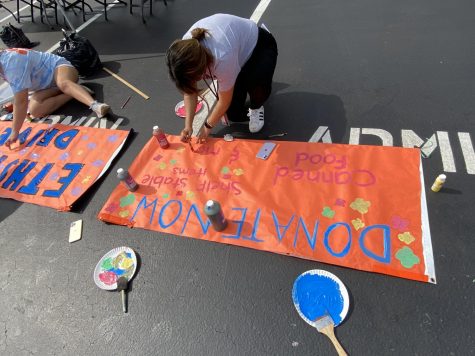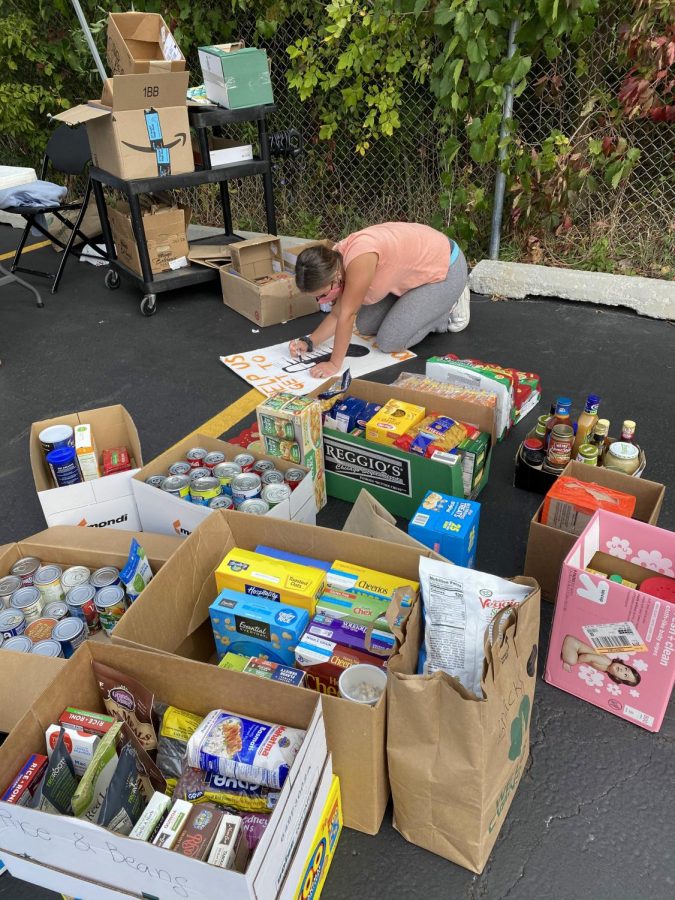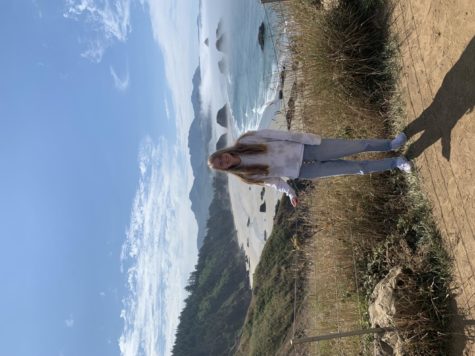Students continue service, activism during COVID-19
Student volunteers prepare for a fall food drive.
January 25, 2021
Junior Joanna Tafolla has a full plate of community and social service responsibilities. She is a committee member of the ETHS Community Service Club, a board member of the school’s chapter of the Society of Hispanic Professional Engineers and is also on the board for Students Without Borders. While the pandemic and the resulting social isolation have posed some challenges in the delivery of services, Tafolla has found herself as busy as ever.
Busy or not, the pandemic still brought challenges. Important projects had to be postponed. In her work with the Society of Hispanic Professional Engineers, not all activities, from their book competition to partnering with Northwestern, were possible. While some activities couldn’t happen, Zoom worked well for holding meetings with Students Without Borders. In that group, Tafolla moved meetings online and led discussions on what was happening with immigration policies as well as fundraised for the undocumented students for scholarships for colleges.
Junior Maia Roothaan is also a student leader in community service at ETHS. She is involved in both Emerge and the Community Service Club Outreach Committee where she helps groups of students create their own service projects based on their own interests, which involves partnering with an organization and creating a final product. Like Tafolla, Roothaan saw how the work was different due to the pandemic.
“The work we do is different, but I still believe that what we are doing is valuable to our members and the community. I would say that our community work has only been strengthened during this time, and that has been a central focus of the club during the pandemic. We are also working on incorporating more social justice work into our events,” says Roothaan.
Another way for students to help is through SOAR, Students Organized Against Racism, which has also had to adapt to the pandemic. Senior Colin Dowhan is a recent addition to the SOAR team.
“I first got into SOAR because I really wanted to join after I was in the junior leadership, senior leadership program. In junior leadership, we had an equity workshop presented to us by SOAR, and I really enjoyed being in that space. I wanted to learn more about my own personal bias. I wanted to join SOAR to educate other people, as well as learn more about myself, so, then, I applied my junior year, and I am now in as a senior,” says Dowhan.
To keep students safe, extracurricular school organizations are functioning differently this year by meeting virtually, and having to participate through a computer screen has affected the number of students who participate in school organizations and the community that these organizations have.
“I feel like, this year, it’s a little harder to have that sense of relationships with people. For me, I was able to meet with them at lunch or go get Starbucks with them, and, now, everything’s virtual. You just see that person or group at a certain time, and you’re like, ‘Okay,’ and then that’s it, you kind of forget about them afterward. There’s not that sense of relationships this year,” says Tafolla.
The lack of in-person interactions has been hard for many students, especially for those who join social service groups as a way to bond with others who share their passion for the same issues.
“I’m only a first-time member, so I’m not totally fluent in knowing what would have been normally. I know, for sure, I’d have a lot of better relationships with just the people in SOAR, because it’s really hard to be a whole group and a real community when it’s all online. It’s kind of hard to have that same face-to-face interaction that bonds people together,” says Dowhan.
Tafolla notes that in other years, freshmen have been drawn to the Community Service Club as a way to meet other students and begin building a friendship group. The fact that everything is online makes it a little more intimidating for them. She says that there has been a big drop in participation among freshmen this year.
“Because of the pandemic, everything is online. So it’s been a lot harder to meet because different students have different schedules, so there’s not been as much participation as in the past years, especially for the Community Service Club. We would [normally] have more than 200 students, and, now, we just have a little over 100 because of student conflicts,” says Tafolla.”I know another factor is that there are a lot of freshmen, and they don’t know a lot about the school. Everything is so new to them, and they don’t know what clubs are out there. I feel like most of our participation comes from new freshmen, but, because of that, there’s not a lot [of participation].”
Tafolla explains that in-person community service events were organized from August to October because of the warm weather. These events followed safety protocols, with social distancing, mandatory mask-wearing and temperature checks. For these events, students were placed in pods where only 25 students could attend. Due to colder weather in the winter, all community service events and informational sessions have to take place virtually.
Though it can be difficult for students, school organizations are eager for people to join them, especially freshmen, who haven’t fully been able to get a feel for everything that goes on in their school.

“This year, for freshmen, I would tell them, ‘It’s okay to be afraid at first. Clubs this year have made it easier for you to want to belong. Get involved because it allows you to expand your interests and allows you to build new relationships with people,’” says Tafolla.
Community service clubs are welcoming by nature. They are formed to help achieve something good for the community. With some encouragement and outreach, students can find service to be a rewarding experience.
“I would tell students that want to get involved that it is really up to them to put in the effort. The service and activism communities I am a part of at ETHS are welcoming, and we really want to hear the voices of as many students that are interested. The one thing I would say that is really crucial is effort and commitment. Remember why you wanted to get started in doing service and hold that with you,” says Roothaan.
There are, of course, a lot of reasons why a student decides to do service work. They might be drawn to a cause, to a commitment to give back to the community or a desire to be part of something that is bigger than themselves.
“It requires a certain level of maturity to be in one of these spaces as well, but SOAR is such an open, inclusive space, so even those who don’t feel as though they don’t belong and live up to the name… They totally have a spot in SOAR, and I feel they can definitely grow from it as people,” says Dowhan.
Being a part of a club can positively affect students and help them connect with others, which is especially important with the isolation that many students are dealing with.
“I feel like being a part of clubs has really helped me, because great friends are part of these clubs. I talked to those friends outside of the club, so just having that friendship that was created within the clubs has helped me,” says Tafolla.
“Being a part of clubs allows you to have a sense of belonging with those groups, so, for me, with my engineering club, I found that that was a way for me to find people who liked the same things as me. I feel all students should take part in extracurricular activities, because it allows them to expand their knowledge, but it also allows them to connect with their interests,” says Tafolla.
With financial difficulty from the pandemic that many people are facing, student participation is even more necessary to help bring aid to others.
“I think student involvement is important, especially this year. We want students to know what’s happening within the community and how this current situation has impacted different communities,” says Tafolla.
Participation brings personal growth and benefits, too. It can help students grow as people and learn about themselves and their communities.
“I think what I’ve learned is that activism and service are closely intertwined,” says Roothaan.
Roothaan also sees a direct correlation between activism and leadership.
“I think the greatest effect I have seen come from student activism is the belief that students can and will lead. There is so much power we have in our voices and the way we use them. I think ETHS students involved in service and activism are really focused on positivity, and I encourage all students to get involved. They should think about issues or ideas that they’ve always wanted to change in their communities and use that to inform the types of service they do. I’ve seen so many benefits from doing service, and I think we should all be finding a way to give back,” says Roothaan.
Once COVID-19 ends, daily life might go back to how it once was, or COVID-19 might have a lasting effect on how activities are run and how people act. Some of the changes in structure and approach are seen as improvements with lasting value.
“After the pandemic, I know we won’t go back to the way it was before, but I feel like organizations will still have a greater need. I think we should still continue to do the same thing we’ve been doing,” says Tafolla.
Tafolla knows that working online has helped people learn better communication skills.
“I know that this year, personally, for the Community Service Club, we have kind of a greater effect. This year, we’ve been working a lot on trying to build that communication and relationship skills. In the past, we would have meetings at the Hub, and it was just kind of like a lecture. We would just tell students, ‘Oh, this is the event, and this is when you can call them and that’s it.’ And there wasn’t a time for students, for volunteers, to come and ask us questions. This year, what we’ve done during meetings, we’ve had icebreakers or mini groups with them where we talk about anything depending on what’s happening. I feel like students and volunteers are able to talk to each other,” says Tafolla.
In the future, Tafolla believes that these skills will continue to be used, as it might be easier for students to hop on Zoom rather than meet in-person.
“You can access online or Zoom anywhere you are, so it’s going to be easier for people to attend,” says Tafolla.
“We definitely want to take some of the events we have done this year in a virtual setting into future years when things are ‘normal.’ It’s been important for all of us to think more about how we can incorporate mutual aid into our events and into the club, and that is something I think all of us want to bring into future years. We’re focusing on thinking about the impact and meaning of our events and how we can make sure to get input from club members,” says Roothaan.
Having a greater online presence can also affect the impact that school organizations can have. Dowhan has hope for how this year’s experiences might help SOAR in the future.
“[SOAR is] definitely is going to [have a wider reach]. Our communications team is working hard to get that communication out there. I’d say, like social media and stuff, especially since more people are online, on these hyperlinks and stuff, I think that the message of SOAR will fully get out a little bit quicker than most,” says Dowhan.
Even with all of the hardship that people have faced this past year, many students have learned how to create a difference in an environment they’ve never had to before, and this experience will be something that they take with them out into the world.
“There is a small glimmer of hope,” says Dowhan.











